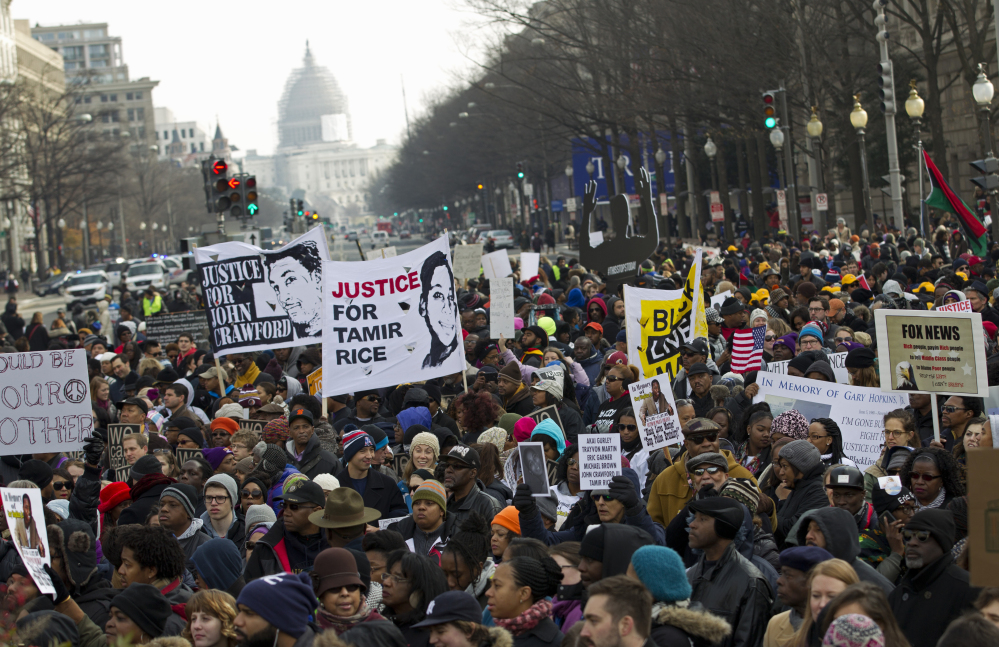HALLOWELL — From our vantage point here in Maine, police brutality against minorities can seem so distant. We enjoy “the way life should be,” so it can be hard to fathom the protests in the streets, the anger online and the desperate passions that have erupted in the wake of the failure to indict the police officers involved in the killings of unarmed black men in Ferguson, Missouri, and Staten Island, New York.
Maine is a state with no big cities, a low crime rate and few minorities at all – but that does not make us immune to the issue of police brutality. The fight against police brutality and for good policing is our fight, too.
It’s our fight because police brutality challenges who we are as Americans, no matter where we live. We Americans like to think of ourselves as the “good guys,” the ones who defend freedom and justice everywhere.
But our moral authority is undermined when our police officers – working in the name of the people, invested with the authority of the state – can harass, humiliate and even kill people without being held accountable for their actions. That lack of police accountability may be expected in Vladimir Putin’s Russia, but we should not tolerate it here in America.
It’s our fight because Mainers have never been meek when it comes to confronting injustice. We may embrace a “live and let live” approach to life, but we do not appreciate people abusing their power. This healthy skepticism toward authority helps account for Maine’s well-known political independence. It also explains why Mainers have a proud history of standing on principle for minority rights, even when there seemed to be no direct connection to Maine.
In the decades before the Civil War, no Mainers owned slaves, yet a sizable number of them joined the abolitionist movement to end the horrific institution of slavery. Hallowell, where I live, was home to two different abolitionist papers; Albion’s Elijah P. Lovejoy gained national fame as an abolitionist publisher before a pro-slavery mob murdered him in 1837.
From attacking slavery to challenging the Ku Klux Klan to supporting the civil rights movement, Mainers have been involved in struggles for justice and against discrimination on the basis of race and religion since the state’s founding.
It’s our fight because we can make a difference. In a democracy, the majority rules. If a minority group – whether it is a racial, religious or ideological minority – wants to change the law, it needs the majority’s support. Black people constitute just 12 percent of the U.S. population (and 1.4 percent of the population of Maine); without support from white allies, they could not achieve racial justice. That was true during slavery, it was true during the civil rights era, and it remains true today.
The incidents in Ferguson, Staten Island and elsewhere give us the opportunity to question our priorities when it comes to fighting crime and rethink the powers that we have delegated to police. We now have a new opportunity, a unique historical moment, to do something about police brutality.
So what can we do here in Maine? Not all of us can or want to attend a protest rally, but we all can educate ourselves about the long history of police brutality in minority communities to understand why the issue generates such anger. The recent killings of unarmed black men are not the actions of a few “bad apples”; they are part of a long-running pattern that has produced deep wells of distrust in minority communities.
We also can act to help change our laws and police procedures. A number of ideas are being discussed, from improving police training procedures to putting cameras on all police officers to ending programs that send military equipment to local police departments. As these ideas coalesce into actual legislation, we can let our representatives in Augusta and Washington know loudly and clearly that we support such changes.
And, just as importantly, we can talk to each other. Around kitchen tables and water coolers, at hockey games and holiday parties, let’s make time to talk about Ferguson and Staten Island, and what police brutality means for our country.
Let’s talk about how it would feel to be targeted by police or live in a community where police act as adversaries rather than protectors. Let’s question why young black men inspire such fear and why we see fit to imprison so many of them.
As we wish each other happy holidays, let us also wish for a nation that truly provides “equal justice under law.” Better yet, let us work together to achieve it.
— Special to the Press Herald
Send questions/comments to the editors.


